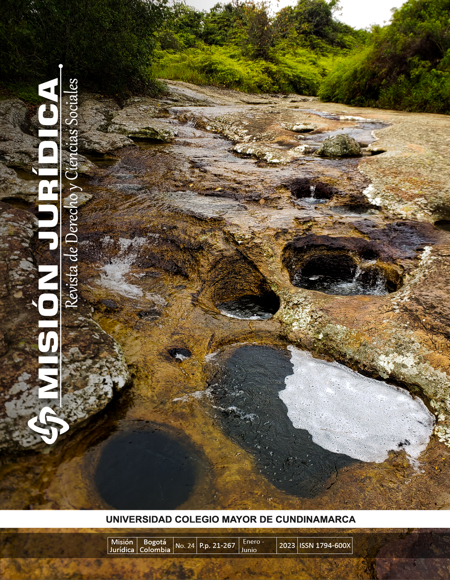Towards adequate protection of Cultural Heritage or Traditional Knowledge
Hacia una protección adecuada del Patrimonio Cultural o Conocimientos Tradicionales
COPYRIGHT PROVISIONS
Every papper included in the magazine can be reproduced whole or in part, provided that respect for its original content, the source is acknowledged and is used with non-commercial academic. Legal mission and its content is protected under a license Creative Commons Attribution-Noncommercial-

Misión Jurídica is distributed under a Creative Commons Attribution-NonCommercial-NoDerivar 4.0 International License.
Based on a work in http://unicolmayor.edu.co/publicaciones/index.php/mjuridica/index.
Permits that go beyond what is covered by this license can be found at http://unicolmayor.edu.co/publicaciones/index.php/mjuridica/index.
Show authors biography
This paper presents a normative analysis on the instruments that give effectiveness to the legal norm in the matter of cultural heritage. The objective is to identify how, within the scope of Mexican Law, the protection of traditional knowledge of indigenous peoples and communities could be guaranteed, taking into account the standards proposed by International Law. Although there are legislative advances, such as the issuance of the Federal Law for the Protection of the Cultural Heritage of Indigenous and Afro-Mexican Peoples and Communities, there are still challenges to face in order to harmonize with copyright and intellectual property regulations.
Article visits 99 | PDF visits 113
Downloads
- Cámara de Diputados. (20 de abril de 2022). senado.gob.mx. https://infosen.senado.gob.mx/sgsp/gaceta/64/3/2021-04-22-1/assets/documentos/Minuta_Puelos_Indigenas_Afromexicanas.pdf
- La Asamblea Legislativa Plurinacional. (23 de Mayo de 2014). Ley del Patrimonio Cultural Boliviano. https://sea.gob.bo/digesto/CompendioII/E/34_L_530.pdf
- Camara de Diputados del H. Congreso de la Unión. (17 de Enero de 2022). https://www.diputados.gob.mx/. https://www.diputados.gob.mx/LeyesBiblio/ref/lfppcpcia.htm
- Castro García, J. (2009). La Propiedad Inmaterial, 253-282. https://dialnet.unirioja.es/servlet/articulo?codigo=3135192
- Congreso de la República de Perú. (2004). Ley de protección al acceso a la diversidad biológica peruana y los conocimientos colectivos de los pueblos indígenas.
- Congreso General de los Estados Unidoa Mexicanos. (s.f.). diputados.gov. https://www.diputados.gob.mx/LeyesBiblio/pdf/LFPPI_010720.pdf
- Congreso General de los Estados Unidos Mexicanos. (s.f.). segob. http://www.dof.gob.mx/nota_detalle.php?codigo=5640770&fecha=17/01/2022#:~:text=Tiene%20por%20objeto%20reconocer%20y,de%20la%20Constituci%C3%B3n%20Pol%C3%ADtica%20de
- Cordero, J. A. (2009). "El desafío Cultural mexicano". Revista Proceso, 9.
- Aguirre, M. Á. (2007). Conocimiento Tradicional de los Pueblos Indigenas de México y recursos Genéticos. Comisión Nacional para el Desarrollo de los Pueblos Indígenas.
- Asamblea Legislativa de Panamá. (2000). Régimen Especial de Propiedad Intelectual sobre los Derechos. Panamá.
- Escobar, A. C. (22 de Mayo de 2015). Acusan a diseñadora francesa de plagio a comunidad Mixe. Milenio. https://www.milenio.com/estilo/acusan-disenadora-francesa-plagio-comunidad-mixe
- Forbes. (14 de Noviembre de 2021). Los siete países con mayor Patrimonio de la Humanidad. Forbes México, 2. https://www.forbes.com.mx/forbes-life/destinos-turismo-los-siete-paises-con-mayor-patrimonio-de-la-humanidad/
- Juan Martínez, V. L. (2022). Plagio, biopiratería y legislación. La (des)protección del patrimonio cultural e inmaterial de los pueblos indígenas en México. Más allá del derecho de autor, 35-41.
- Monreal Ávila, R., & Harp Iturribarría, S. (18 de Noviembre de 2018). susanaharp.org. https://www.susanaharp.org/susanaharp/wp-content/uploads/2020/05/201118-Iniciativa-Ley-de-Salvaguardia.pdf
- Organización de las Naciones Unidas (ONU). (10 de Diciembre de 1948). Declaración Universal de los Derechos Humanos. http://www.un.org/es/sections/universal-declaration/history-document/index.html
- Organización Mundial de la Propiedad Intelectual. (24 de JULIO de 1971). https://www.wipo.int/portal/en/index.html. https://www.wipo.int/edocs/pubdocs/es/wipo_pub_287-accessible1.pdf
- Organizacion Mundial de la Propiedad Intelectual. (s.f.). wipo.int. https://www.wipo.int/treaties/es/
- Organización de las Naciones Unidas para la Educación, l. C. (17 de octubre de 2003). www.unesco.org. http://portal.unesco.org/es/ev.php-URL_ID=17716&URL_DO=DO_TOPIC&URL_SECTION=201.html
- Organización Internacional del trabajo. (27 de junio de 1989). https://www.senado.gob.mx. https://www.senado.gob.mx/comisiones/desarrollo_social/docs/marco/Convenio_169_PI.pdf
- Organización Mundial de las Naciones Unidas. (13 de septiembre de 2007). un.org.com. https://www.un.org/esa/socdev/unpfii/documents/DRIPS_es.pdf
- Ouma, M. (2017). Los conocimientos tradicionales y las dificultades que afrontan los legisladores internacionales. OMPI Revista. http://www.wipo.int/wipo_magazine/es/2017/01/article_0003.html
- Pina, R. d. (2011). Elementos de Derecho Civil Mexicano. Porrúa.
- Presidencia de la República de Brasil. (20 de mayo de 2015). https://legislacao.presidencia.gov.br. https://legislacao.presidencia.gov.br/atos/?tipo=LEI&numero=13123&ano=2015&ato=9a0ITU65UNVpWTc7b
- Ramírez, M. (17 de Julio de 2017). Pueblos Indígenas.Louboutin explota a indígenas mayas. La Izquierda Diario. https://www.laizquierdadiario.mx/Louboutin-explota-a-indigenas-mayas
- Senado de la República de los Estado Unidos Mexicanos. (21 de abril de 2022). enado.gob.mx. https://www.senado.gob.mx/64/gaceta_del_senado/documento/117056
















